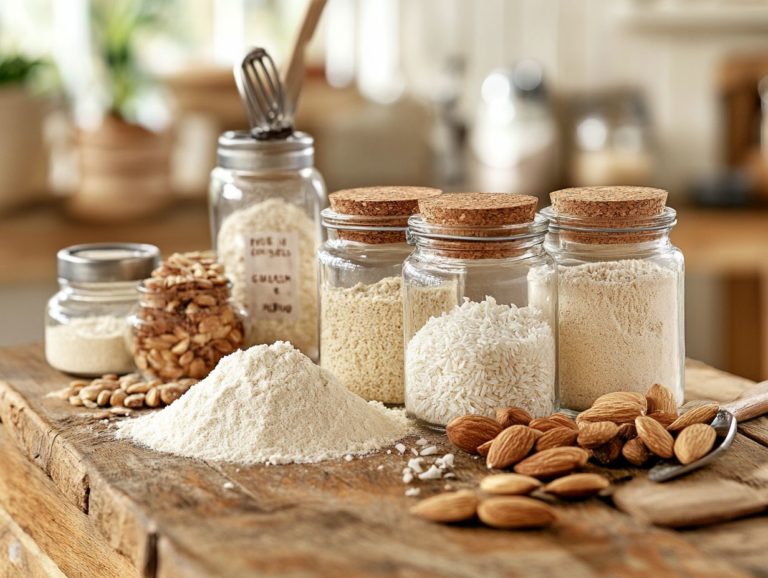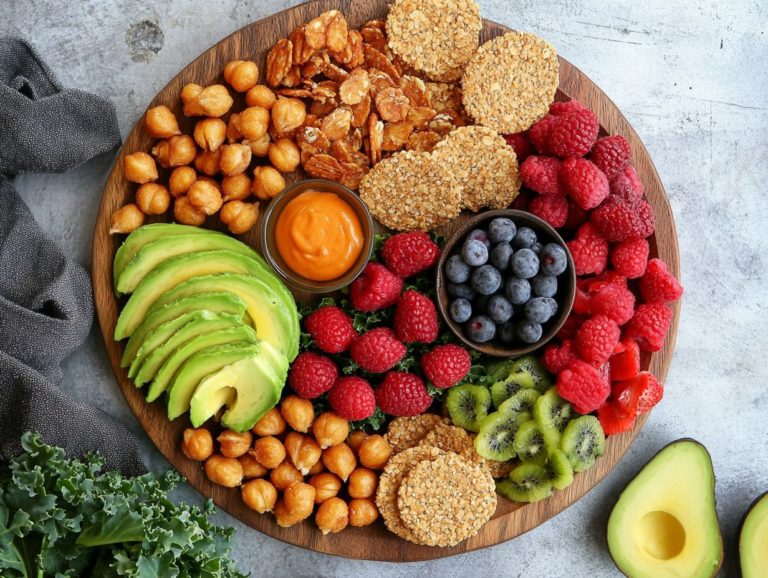Are Store-Bought Gluten-Free Snacks Safe?
Navigating the world of gluten-free diets and exploring various gluten-free snacks can be both rewarding and challenging.
While you may embrace this lifestyle for its potential health benefits, such as improved digestion and reduced inflammation, it s crucial to remain aware of the possible risks, including nutrient deficiencies and higher costs.
This article delves into the advantages and disadvantages of a gluten-free diet, explores the types of gluten-free snacks available, offers snack reviews, and provides tips on finding safe store-bought options.
Whether you re contemplating a gluten-free journey or simply curious about the subject, you ll find valuable insights tailored for your needs.
Contents
- Key Takeaways:
- What Are The Benefits Of A Gluten-Free Diet?
- Discover Delicious Gluten-Free Snacks!
- Gluten-Free Crackers And Chips
- Are Store-Bought Gluten-Free Snacks Safe?
- Tips for Maintaining a Gluten-Free Diet
- Frequently Asked Questions
- Are Store-Bought Gluten-Free Snacks Safe?
- What does “gluten-free” mean?
- How can I be sure that a store-bought gluten-free snack is truly gluten-free?
- Can I trust the ingredients list on a store-bought gluten-free snack?
- Are store-bought gluten-free snacks healthier than regular snacks?
- Are there any potential risks to consuming store-bought gluten-free snacks?
Key Takeaways:
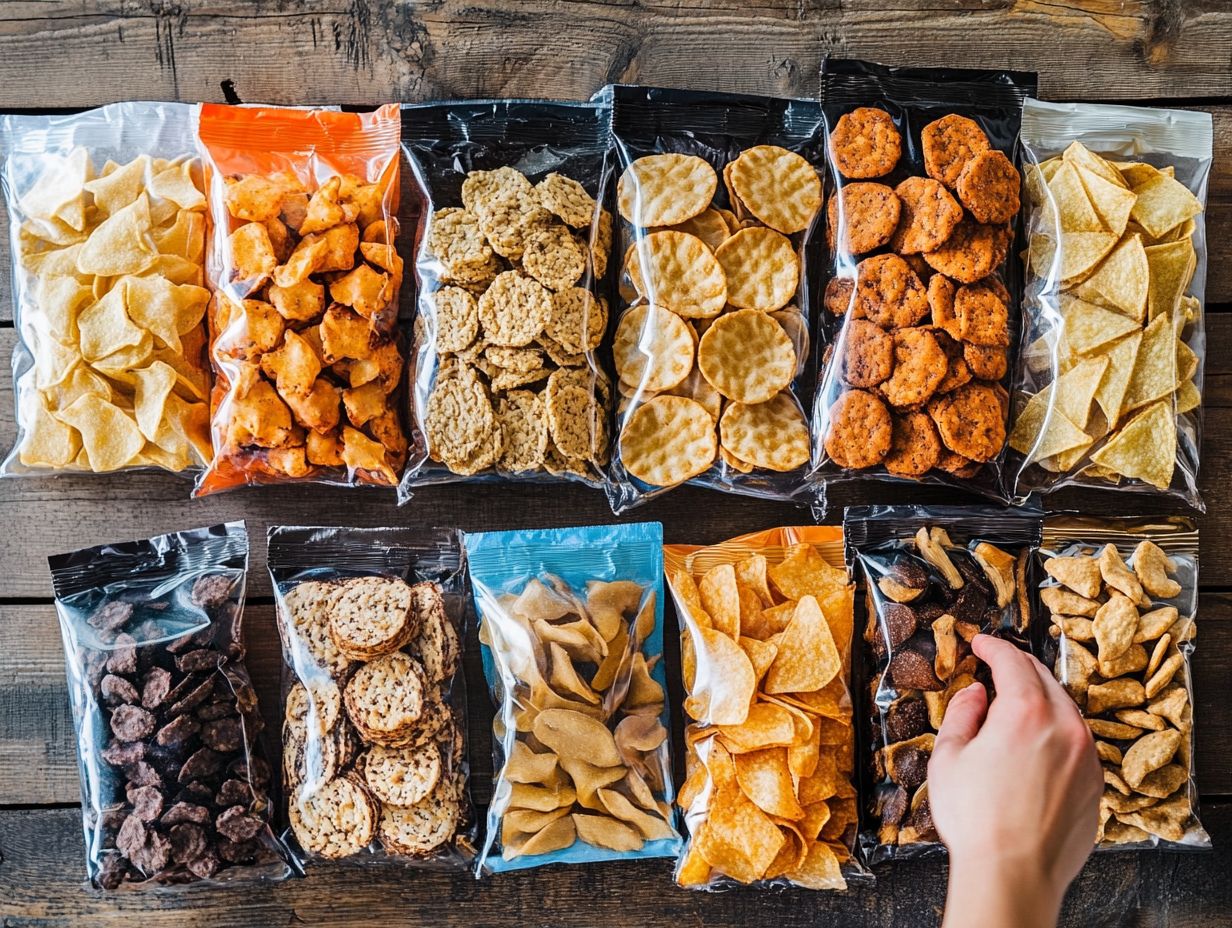
- Store-bought gluten-free snacks can be safe if proper precautions are taken.
- Look for certified gluten-free labels and carefully read ingredients to ensure safety.
- Avoid products with shared equipment and be aware of potential cross-contamination.
What Are The Benefits Of A Gluten-Free Diet?
The benefits of a gluten-free diet reach far beyond merely evading gluten; they encompass a range of health enhancements that can greatly elevate your overall well-being.
By cutting out gluten-containing foods, you may find significant relief from digestive troubles such as bloating and gas.
Many people find that embracing a gluten-free lifestyle leads to decreased inflammation in the body, resulting in heightened energy levels and improved nutrient absorption. This sets the stage for making healthier food choices and indulging in delightful snacks, including enticing gluten-free options like chips and cookies.
1. Helps With Digestive Issues
One of the most significant advantages of adopting a gluten-free diet is its remarkable ability to alleviate various digestive issues, particularly for those with gluten sensitivities or celiac disease.
By eliminating gluten from your meals, you may find a substantial reduction in symptoms like bloating, diarrhea, and abdominal pain. Such improvements can profoundly enhance your overall well-being and quality of life.
As a delightful alternative to traditional snacks, gluten-free options such as Savor By Suzie’s delectable treats, Emmy s Organics satisfying coconut macaroons, and Siete cookies offer perfect replacements, allowing you to indulge without discomfort.
Incorporating these tasty snacks into your gluten-free lifestyle not only satisfies your cravings but also promotes a healthier digestive system.
2. Reduces Inflammation
One of the standout benefits of embracing a gluten-free diet is the potential reduction in inflammation, which plays a significant role in your overall health and can contribute to various chronic conditions.
For those sensitive to gluten, even a small amount can trigger inflammatory responses, resulting in pain or discomfort that disrupts daily life. By making the shift to a gluten-free lifestyle, you may find it much easier to manage these symptoms.
To support an anti-inflammatory approach, incorporating healthy snacks is essential. Consider options like:
- Hummus with vegetable sticks
- Quinoa salad
- Nut-based energy bars
- Foods Alive flax crackers
These snacks offer nutritional benefits and help soothe inflammation. By choosing gluten-free options, you re accommodating dietary restrictions while boosting your overall vitality, making these choices a smart strategy for maintaining your health.
3. Improves Nutrient Absorption
Improved nutrient absorption is yet another compelling reason for you to consider a gluten-free diet. Many individuals discover that eliminating gluten allows their bodies to absorb essential nutrients more effectively.
This is particularly significant, as gluten can lead to inflammation in the gut, which in turn damages the intestinal lining. Such damage hinders the absorption of vital nutrients. This makes it challenging to obtain the vitamins and minerals necessary for optimal health.
By embracing a gluten-free lifestyle, you not only reduce digestive discomfort but also enhance your overall nutritional intake. If you’re on the lookout for delicious yet nutrient-dense gluten-free snack options, consider indulging in yogurt bars from Clio or granola from Michele s Granola. Other healthy options include Cretors popcorn and Kates Real Food bars. Don t miss out on these tasty alternatives that support a balanced diet while ensuring that essential nutrients are consistently absorbed.
What Are The Risks Of A Gluten-Free Diet?
While a gluten-free diet offers numerous benefits, it s crucial for you to remain mindful of its potential risks, especially if you re not strictly adhering to gluten-free principles.
One major concern is the risk of nutrient deficiency; many gluten-free products simply don t pack the essential vitamins and minerals that their gluten-containing counterparts do. Additionally, you may find that gluten-free snacks and products can be pricier, which might make it challenging to maintain a well-balanced diet.
Finally, if you have severe gluten sensitivities, cross-contamination, which occurs when gluten-free foods come into contact with foods containing gluten, is a serious concern that demands your attention proper food selection and preparation are vital for your health.
1. Lack Of Nutrients
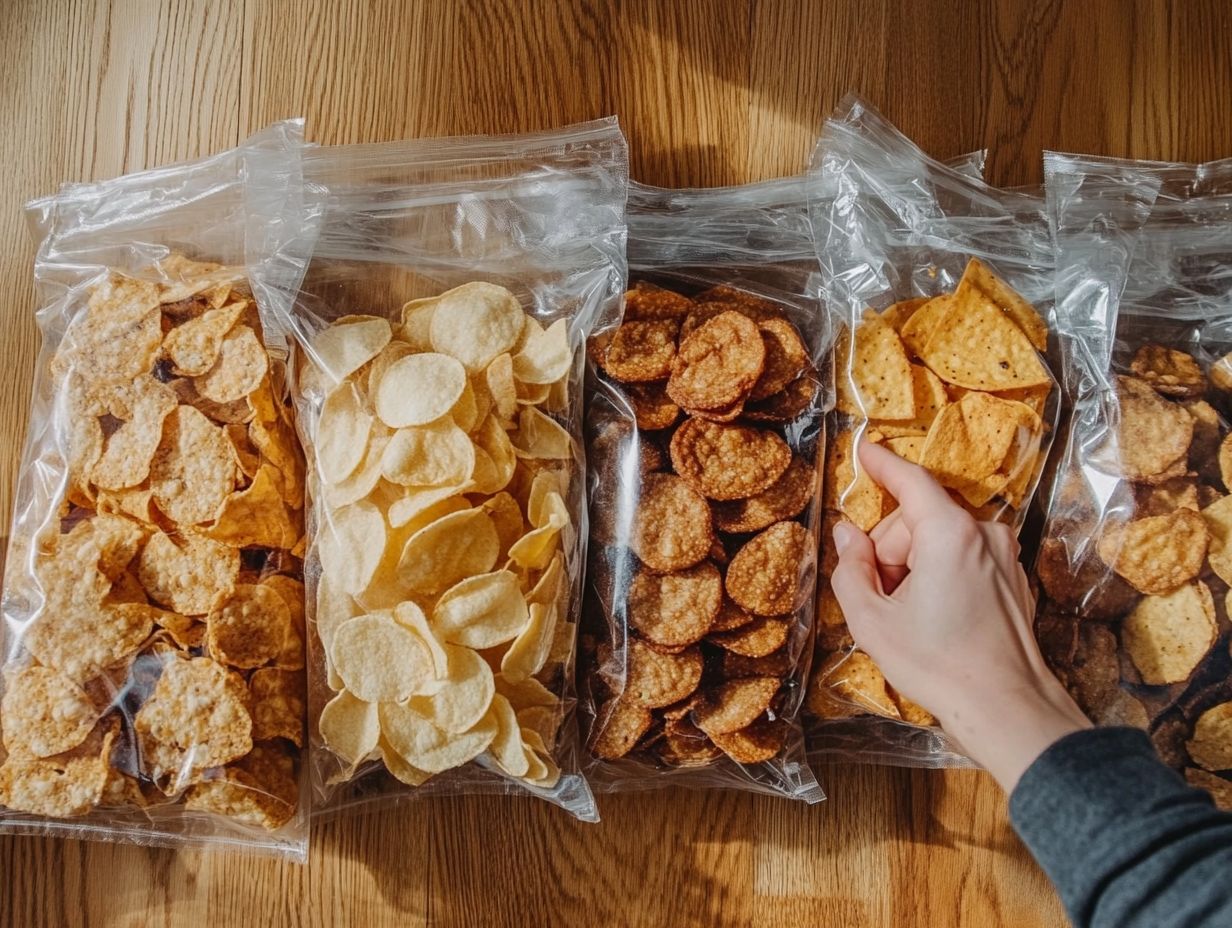
One of the primary risks of adopting a gluten-free diet is the potential for missing out on essential nutrients. Many gluten-free foods are processed and often lack the nutritional value found in whole grains.
This shortfall can lead to deficiencies in vital vitamins and minerals, particularly B vitamins, iron, and fiber. Whole grains, for example, are significant sources of fiber and iron, both of which play crucial roles in digestion and maintaining your energy levels.
To combat these deficiencies, you can incorporate snacks like quinoa salads, which are packed with protein and fiber. Other excellent options include:
- The Only Bean crunchy broad beans
- Real Cookies bakehouse-style cookies
- Serenity Kids grain-free puffs
- Almond flour-based cookies, which are rich in magnesium and healthy fats
- Roasted chickpeas, delivering a satisfying boost of fiber and protein
Snacking on a variety of fruits and vegetables greatly enhances your overall nutrient intake, helping you maintain a balanced diet while navigating the restrictions of a gluten-free lifestyle.
2. Higher Cost
When you consider adopting a gluten-free diet, one important factor to keep in mind is the potentially higher cost of gluten-free products, which can put a strain on your household budget over time.
The price disparity often stems from the specialty ingredients necessary to craft gluten-free snacks, along with the smaller production scales of many brands. You might find yourself spending a bit more on quality options, but don’t overlook brands like Purely Elizabeth and Artisan Tropic they ve emerged as affordable yet dependable choices.
These brands focus on health without sacrificing taste, offering snacks that are not only gluten-free but also crafted from wholesome, nutrient-dense ingredients. This commitment to quality does lead to higher production costs, but for many, the investment in health is truly worth every penny. Consider affordable yet nutritious options from Foods Alive and The Only Bean.
In conclusion, a gluten-free diet can offer both benefits and risks. While it may improve nutrient absorption and reduce digestive discomfort, it’s essential to remain vigilant about nutrient deficiencies and costs. Explore gluten-free options and consider consulting a nutritionist for personalized advice.
3. Cross-Contamination
Cross-contamination poses a significant risk for anyone adhering to a gluten-free diet. Even the tiniest trace of gluten can provoke serious reactions in those with sensitivities.
To effectively minimize these risks, you must implement best practices both in your kitchen and while shopping for food. When preparing meals, it s wise to designate specific utensils, cutting boards, and counter spaces exclusively for gluten-free foods. This simple step can dramatically decrease the chances of cross-contact.
Cross-contact refers to the unintended transfer of gluten to gluten-free foods. During your grocery shopping trips, seek out reputable brands like Gluten-Free Prairie, Enjoy Life, and Epic Venison, which are committed to maintaining safety in their production processes. Scrutinizing labels for certifications can provide reassurance that products are free from cross-contamination.
By adopting these measures, you create a safer space for you and anyone else with gluten sensitivities.
Discover Delicious Gluten-Free Snacks!
Gluten-free snacks present a remarkable array of food choices crafted for those who cannot consume gluten. They offer delicious and healthy alternatives for anyone following a gluten-free diet.
You ll find everything from crunchy chips to indulgent cookies and nutritious yogurt bars, each designed to please various palates and accommodate dietary restrictions.
Brands like Undercover Snacks, Emmy s Organics, and Honest Review provide an impressive assortment of gluten-free snacks that not only fulfill dietary requirements but also satisfy your cravings. This makes it simpler to enjoy a well-rounded diet. Don’t forget to try the tasty Choomies and Jilz cracker options.
1. Fruits And Vegetables
Fruits and vegetables are your go-to, naturally gluten-free snacks. They not only elevate your overall health but also help curb your hunger between meals. Pair them with snacks from Lil Bucks or Siete for a delightful and nutritious treat.
By incorporating a diverse array of these vibrant foods into your gluten-free diet, you’ll be treating your body to essential vitamins, minerals, and fiber key components for maintaining optimal health. Consider colorful fruits like berries and citrus, which are brimming with antioxidants, while leafy greens provide a generous dose of iron and calcium.
These fruits and vegetables are incredibly versatile. You can enjoy them raw, whip them into smoothies, or roast them to bring out their rich flavors. When you pair these natural snacks with gluten-free products from brands like Lil Bucks, you’re not just enhancing your meals, but also boosting their nutritional value. This makes them a fantastic addition to anyone’s diet.
2. Nuts And Seeds
Nuts and seeds present a premium gluten-free snack option. They deliver healthy fats and proteins while significantly contributing to your overall well-being.
When you re on the hunt for nutritious alternatives, you’ll find a delightful variety of nuts and seeds at your disposal, such as almonds, walnuts, pumpkin seeds, and chia seeds each boasting its own unique set of health benefits. For instance, almonds are a fantastic source of vitamin E and magnesium, while walnuts are rich in omega-3 fatty acids, which are excellent for supporting heart health.
Incorporating these gluten-free options into your daily snacks is a breeze. Simply toss some into your yogurt or blend them into your smoothie bowls for an extra boost. Brands like Blue Diamond Almonds and Enjoy Life Foods provide convenient nut and seed-based snacks that cater specifically to gluten-free diets. This ensures that you can enjoy delicious and nutritious treats wherever life takes you.
Gluten-Free Crackers And Chips
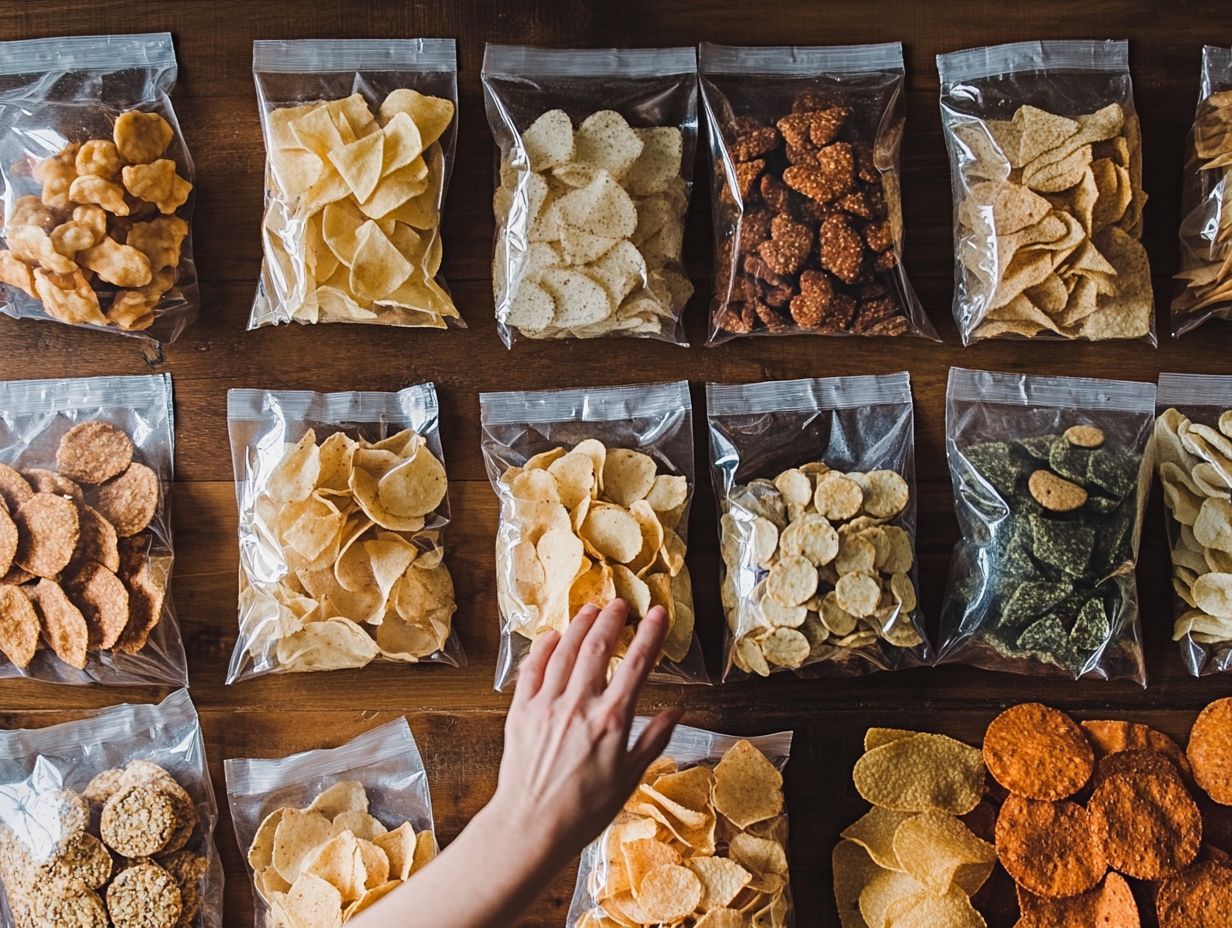
Gluten-free crackers and chips offer a satisfying crunch and are skillfully crafted to replicate traditional snack options, ensuring safety for those with gluten sensitivities.
These delightful snacks come in a stunning variety of styles and flavors, making them a versatile choice for any occasion. Options include savory varieties made with almond flour or chickpea flour and those infused with unique spices and herbs that pack an added punch.
Brands like Siete provide irresistibly crispy tortilla chips crafted from wholesome ingredients such as cassava and coconut flour, perfect for dipping or enjoying on their own. Cretors offers gourmet popcorn that is gluten-free, enticing snack enthusiasts with diverse and exciting flavors.
With such an impressive selection, it’s easy for anyone avoiding gluten to discover snacks that align with their taste preferences, all without sacrificing flavor or texture.
Are Store-Bought Gluten-Free Snacks Safe?
The safety of store-bought gluten-free snacks is a major concern for those with gluten sensitivities. Not all products are created equal, so it s crucial to familiarize yourself with certification labels and ingredient lists.
Look for products that are distinctly labeled as ‘certified gluten-free’. This designation provides reassurance that they adhere to rigorous safety standards, significantly minimizing the risk of cross-contamination during production or packaging. Additionally, it’s important to consider whether store-bought gluten-free snacks are a healthy choice.
1. Look For Certified Gluten-Free Labels
When searching for gluten-free snacks, one of your first priorities should be to look for certified gluten-free labels. These labels assure you that the product has undergone rigorous testing to confirm it is free from gluten.
Such labels are crucial for those with celiac disease or gluten sensitivity, indicating that the snacks comply with strict standards set by certification organizations. By opting for products that display these labels, you reduce the risk of accidental gluten exposure, allowing yourself to indulge in a wider variety of foods.
Make it a habit to check for certification while you browse the aisles; this simple action can lead to safer snack choices. Remember, informed decisions can make all the difference in maintaining a healthy and enjoyable gluten-free lifestyle. To learn more about the safety of snacks, you can refer to whether gluten-free snack food is safe for children.
2. Check The Ingredients List
Always examine the ingredients list on gluten-free snacks to ensure there are no hidden sources of gluten. Be on the lookout for gluten, which may be hidden in seemingly harmless items like sauces, dressings, and broths.
Stay vigilant, as common ingredients like modified food starch (a processed ingredient that sometimes contains gluten), malt flavoring, and various preservatives can frequently contain gluten.
Fortunately, safe alternatives abound. Ingredients like rice, quinoa, and corn are typically good choices for those following a gluten-free diet. When shopping, keep an eye out for certified gluten-free labels or phrases like “naturally gluten-free”, but always read the full ingredient list.
By doing this, you can avoid potential cross-contamination and ensure a safer, more enjoyable dining experience.
Don t wait make checking labels a priority for your health!
In conclusion, choosing the right gluten-free snacks is crucial for your health. By being vigilant in checking labels and understanding ingredients, you can enjoy a variety of safe and delicious snacks.
Tips for Maintaining a Gluten-Free Diet
To minimize the risk of mixing with gluten, avoid gluten-free snacks produced in facilities that also process gluten-containing products. Shared equipment can easily lead to trace amounts of gluten sneaking into the final product.
This concern is particularly important for those with celiac disease or gluten sensitivity, where even the tiniest exposure can trigger severe reactions. These facilities often operate with shared production lines. Without strict protocols, remnants from wheat-based products can inadvertently mix with gluten-free alternatives.
As a consumer, be meticulous in selecting brands that clearly label their products as gluten-free. Verify that their manufacturing processes are dedicated and certified. Choose brands that prioritize safe snacking practices to indulge in your favorite treats without the anxiety of harmful cross-contamination. This ultimately promotes better health and well-being.
4. Be Mindful Of Cross-Contamination
Being mindful of mixing with gluten is essential for anyone following a gluten-free diet, as even trace amounts can trigger adverse reactions in sensitive individuals.
To ensure your safety, adopt various strategies both at home and while dining out. At home, designate specific areas for gluten-free food preparation. Utilize separate cutting boards, utensils, and storage containers to minimize any risk.
When dining out, communicate your dietary needs clearly with the restaurant staff. Don t hesitate to ask specific questions about their gluten-free practices your safety is worth it. Take the time to check labels on gluten-free snacks, ensuring they are certified gluten-free and stored properly away from gluten-containing products. This extra diligence enhances safety and brings peace of mind.
Frequently Asked Questions
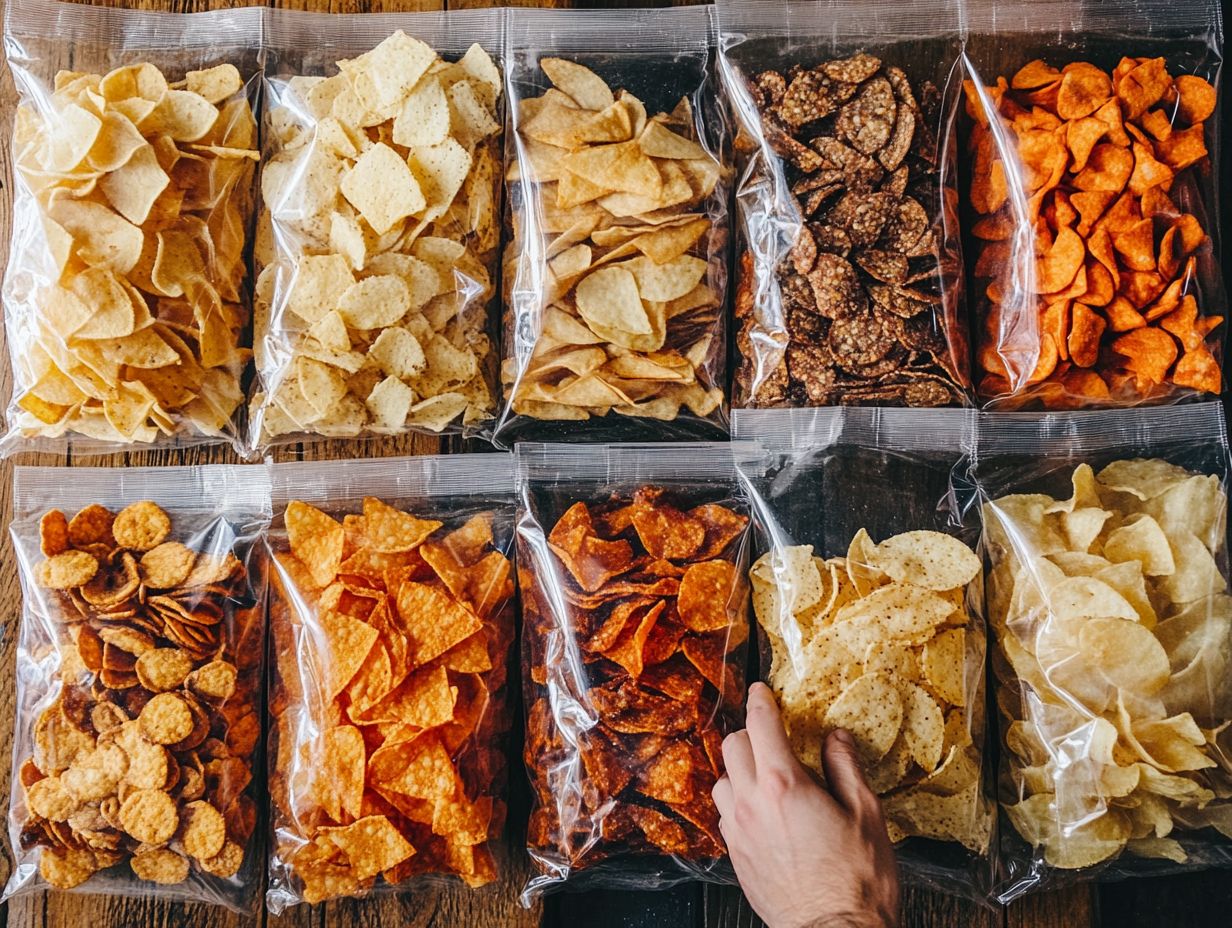
Are Store-Bought Gluten-Free Snacks Safe?
Yes, store-bought gluten-free snacks are safe for individuals with gluten intolerance or celiac disease. These snacks are specially made to be free of gluten, ensuring that they do not cause any adverse reactions.
What does “gluten-free” mean?
“Gluten-free” means that a product does not contain any gluten, a protein found in grains such as wheat, barley, and rye. This is important for individuals with celiac disease or gluten intolerance, as consuming gluten can cause serious health issues.
How can I be sure that a store-bought gluten-free snack is truly gluten-free?
To ensure that a snack is truly gluten-free, look for a certification label from a reputable organization, such as the Gluten-Free Certification Organization (GFCO) or the Celiac Support Association (CSA). These labels indicate that the product has undergone rigorous testing and meets strict gluten-free standards.
Can I trust the ingredients list on a store-bought gluten-free snack?
While ingredients lists can be helpful in determining if a snack is gluten-free, remember that some ingredients derived from gluten-containing grains, such as maltodextrin, may still be used in small amounts in gluten-free products. Look for “gluten-free” on the front of the package or a certification label to be sure.
Are store-bought gluten-free snacks healthier than regular snacks?
Not necessarily. Just because a snack is labeled as gluten-free does not automatically mean it is healthier. Read the nutrition label and ingredients list to determine the overall nutritional value of the snack.
Are there any potential risks to consuming store-bought gluten-free snacks?
In general, store-bought gluten-free snacks are safe to consume. However, some gluten-free snacks may still contain high levels of sugar, sodium, or unhealthy ingredients. Choose healthy snacks with whole, natural ingredients whenever possible. For instance, consider trying Artisan Tropic, Savor By Suzie, or Lil Bucks for healthier options.

